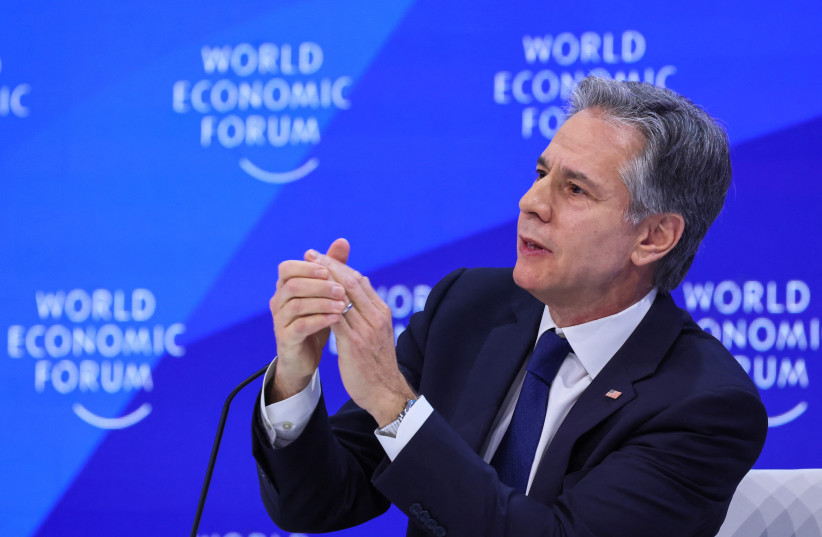With each passing week, you can hear the drumbeat growing louder as the Biden administration turns up the heat on Israel, inexplicably demanding in the middle of a war that Jerusalem agree to the establishment of a Palestinian state.
In a remarkably tone-deaf bit of diplomacy, various senior American policymakers have been reiterating that they view it as essential for the Jewish state to turn over territory to the Palestinians.
Speaking at the World Economic Forum in Davos, Switzerland, last week, Secretary of State Antony Blinken insisted, apparently with a straight face, that Israel could not achieve “genuine security” without a “pathway to a Palestinian state.”
“The question now is,” he wondered aloud, “is Israeli society prepared to engage on these questions? Is it prepared to have that mindset?”
The timing of Blinken’s philosophical ruminations can best be described as bizarre, particularly when one considers that Israel is currently under attack, battling Hamas in Gaza and Hezbollah in Lebanon, even as rockets are fired at it from Syria and Yemen.

Does he really expect Israeli society to focus right now on grappling with how to solve an intractable century-old conflict while hundreds of thousands of soldiers are at the front, unsure of whether the war may spread?
Not content with raising the idea in public, Blinken’s boss decided to do so in private as well.
Last Friday, in his first phone call with Prime Minister Benjamin Netanyahu in nearly a month, President Joe Biden reportedly spent much of the 40-minute conversation pressing Israel to agree to the so-called “two-state solution.”
The Biden administration’s fixation with getting Israel to capitulate and agree to a Palestinian state has gone far beyond persistence and has now entered the realm of obsession.
With so much uncertainty hanging over the Middle East right now, as fears of a wider conflict involving Iran grow, talk of creating a Palestinian entity is not only ill-timed but completely ludicrous.
Hamas has already stated categorically that it rejects the idea of a two-state solution, and the corrupt Palestinian Authority in Ramallah, which continues to pay salaries to Palestinian terrorists, is hardly a viable partner for any future endeavors.
SO WHAT, then, could possibly be motivating Biden and his team at this particular juncture? Why would they push so hard for a Palestinian state now, particularly when they know that is the last thing the Israeli government and public would agree to in the wake of the October 7 attacks?
Why the Biden administration needs a Palestinian state: Michigan
The answer, not surprisingly, boils down neither to statesmanship nor concern for Israelis or Palestinians. It is, in fact, something far more mundane: electoral politics.
Simply put, Biden is looking increasingly vulnerable in the polls, and that is due, at least in part, to growing anger among Arab-Americans and the progressive wing of the Democratic Party.
The battleground state of Michigan, home to more than 200,000 registered voters who are Muslim, is a case in point.
As The Wall Street Journal put it bluntly earlier this week, “Michigan is flashing warning signs for President Biden’s reelection bid.”
The paper noted that “top Democrats” in the state “are sounding alarms about recent polls showing Biden trailing Donald Trump,” in some cases “by nearly double digits.”
Indeed, as Politico reported on January 8, a poll earlier this month in Michigan found the former president beating Biden by eight points – 47% to 39% – among likely voters in the state.
Pollster Richard Czuba, founder of the Glengariff Group, which conducted the survey, said, “If I were a Democrat in Michigan, I would be breaking the emergency fire alarms in the White House and demanding to know what the plan is for Michigan.”
With its 15 electoral votes, Michigan is considered critical to a White House victory for either party.
In 2016, Trump became the first Republican presidential candidate to win Michigan since 1988, edging out Hillary Clinton by fewer than 11,000 votes. Four years later, Biden won the state by a margin of over 150,000 votes over Trump.
But recent polls show that Trump now has a sizable lead in Michigan. And while there are a number of factors at play, a critical one is whether the state’s Muslim population will come out for Biden or sit the election out.
In 2020, nearly 70% of Michigan’s Muslim population cast their ballots for Biden, helping him to win the state. But as an NPR report put it two months ago, “In Michigan, where every vote counts, Arab Americans are turning away from Biden.”
And they are not alone. Other surveys have shown that many young voters are furious at Biden for his support of Israel.
Social media is filled with posts from young progressives and Arab-Americans speaking in very harsh terms, saying that Biden has “Palestinian blood on his hands” and they will never vote for him.
In the larger context of the electorate, this spells serious trouble for the Democratic incumbent.
According to the Real Clear Politics aggregate of national polls from earlier this week, Trump is leading Joe Biden by 47.2% to 44.3%. Biden’s approval rating is a miserable 39.8, while his disapproval rating is 56.4. Only 24.1% of Americans think the country is on the right track, while a whopping 66.7% think it isn’t.
CLEARLY, AS Biden and his team look ahead to the November presidential elections, they are surely concerned about the domestic electoral fallout from the fighting in Gaza, which could further dampen their support among certain key constituencies.
And it is therefore highly likely that they will continue to push and prod Israel in the coming months to agree to a Palestinian state. Not because it is good for Israel nor even for America – but because it may be Biden’s only chance to win back some disaffected Democratic voters.
Sounds cynical? Perhaps. But for anyone who follows American presidential politics, that should come as no surprise. ■
